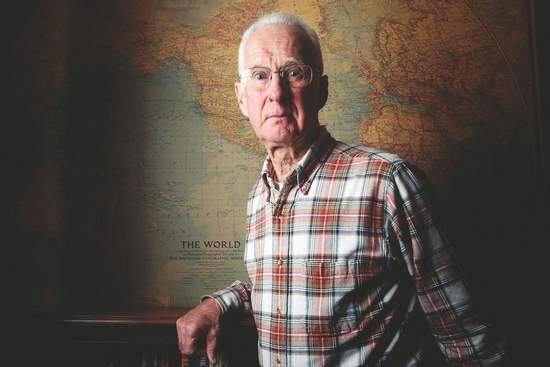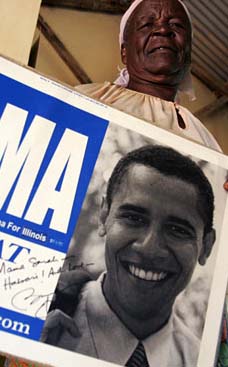
In villages where he worked, residents typically let their chickens run free and fed them corn. Riley taught them if they fed their chickens concentrate and confined them, the chickens would lay eggs and grow bigger. Another challenge was teaching skills locals would retain “when the gringos are gone,” he continued, sprinkling Spanish words in with English as he spoke. So, he would first buy their chickens, feed and vaccines and they would repay him when they sold the chickens. Each time, he paid less of their up-front expenses until they were buying the chickens and supplies on their own. Even now that he’s home, Riley still continues to help. He recalled a Guatemalan woman whom he had advised to raise chickens and to start her own bank account. “Three of her kids have finished beyond high school,” he said. Now, he’s paying for one of her daughters to study nursing in Guatemala.
Bill Riley has served in five different sites in Guatemala ranging from low-lying coastal areas filled with banana plantations to mountainous regions inhabited by indigenous Mayans to jungle-like areas where howler monkeys swung and Mayan ruins lay just outside his door
Glide retiree returns from fifth Peace Corps stint in Guatemala
by Kathy Korengel
Caption: Bill Riley just returned from his last tour of duty for the Peace Corps in Guatemala. He's been helping villagers there on and off for the past 13 years, after retiring from the U.S. Air Force. Photo: JON AUSTRIA/The News-Review
GLIDE — Bill Riley had a hard time convincing Guatemalan villagers of the wisdom of feeding and confining their chickens. But once during his Peace Corps work there, he had to leave the village for three days and left his own well-fed and confined chickens with his neighbor.
She found they laid eggs, something local chickens didn’t do much. Then she wanted some of her own, recalled Riley, 74, who recently returned from his fifth Peace Corps stint in the Central American country.
The experience is one of many Riley, a retired Air Force lieutenant colonel, recalls fondly of his last 13 years.
These kind of stories, as well as his reputation for being hard-working, selfless and modest, have led national Peace Corps staff to nickname Riley “(affectionately) ... ‘Chicken Bill,’’’ said fellow former Peace Corps volunteer Alfred Aufdemberge in an e-mail from his Lincoln, Kan., home.
Riley developed his animal husbandry skills many decades before, growing up on his grandparents’ farm in Riversdale, west of Roseburg, and then studying dairy husbandry at Oregon State University.
He also started traveling widely many years before. For 24 years, he worked as a navigator — “like a back seat driver to a pilot” — as well as coordinating fueling of air planes on military bases from California to Vietnam to Hawaii.
So, when he retired in 1981 and his three children had flown the household coop, Riley said, “It was just kind of boring sitting around home waiting to die.”
When he heard a Peace Corps ad seeking people with agricultural skills, he strapped back on his traveling boots.
Riley has served in five different sites in Guatemala. They ranged from low-lying coastal areas filled with banana plantations to mountainous regions inhabited by indigenous Mayans to jungle-like areas where howler monkeys swung and Mayan ruins lay just outside his door.
He’s lived in concrete-block homes, cooked over hot plates and used a wood stove to heat his humble homes.
But what he gets most excited talking about is his work in the Peace Corps. He agreed to an interview on the condition the story promote the Peace Corps and “not to glorify myself.”
In villages where he worked, residents typically let their chickens run free and fed them corn. Riley taught them if they fed their chickens concentrate and confined them, the chickens would lay eggs and grow bigger.
Another challenge was teaching skills locals would retain “when the gringos are gone,” he continued, sprinkling Spanish words in with English as he spoke.
So, he would first buy their chickens, feed and vaccines and they would repay him when they sold the chickens.
Each time, he paid less of their up-front expenses until they were buying the chickens and supplies on their own.
Even now that he’s home, Riley still continues to help. He recalled a Guatemalan woman whom he had advised to raise chickens and to start her own bank account.
“Three of her kids have finished beyond high school,” he said. Now, he’s paying for one of her daughters to study nursing in Guatemala.
But, for all the lessons he taught others, Riley learned as much in return. “I guess we learned you can survive and thrive in much more austere conditions than you would think.”
And to go ahead and try things you wouldn’t try here. With no access to veterinarians, he learned novel, native treatments for animal ailments.
He also found benefits to living there. He found locals treated him with “an aura of respect” he didn’t find as an older person here.
They were friendlier. When he walked down a road, he always was greeted. “People ask, ‘Where are you going? What are you doing? How many kids do you have?’ ”
The work also helped Riley stay fit as he had to walk two or three miles to his work sites, five, six, seven days a week.
“It’s a beautiful, very, very diverse country,” he continued, with topography that ranges from mountains to desert to the coast.
“With wonderful people,” he said. “They would give you the shirts off their backs.”













